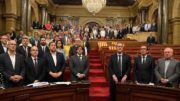The phantom republic and the spinning left
They have finally done it! After weeks of confusing messages, yesterday the Catalan parlament conjured the illusion of an independent republic. By secret vote (because the vote was illegal), in the name of liberty (llibertat) they have abandoned legal self-government for a phantom and illegal republic, with no viable economy, no international recognition, and no police force or even civil administration under its control.
Secession for this prosperous and very free society is a reactionary goal that would be terribly costly for Spain but an absolute disaster for Catalonia, as I spelled out in a previous note. It couldn’t last, not only because of its political isolation, unbearable debt and loss of resources, but also because the groups now pushing for it have absolutely opposed agendas and are never going to be able to agree.
What needs explanation is how such a retrograde and antidemocratic movement has won support or at least doubts among groups that think of themselves as “leftist”. In Spain, the supposedly leftist Podemos, though not advocating independence, has abstained from any criticism, and many outside of Spain are very confused as to who is really acting democratically.
Part of the explanation is that the leaders of this insurrection have been far more active in presenting their case than has the Spanish state. The state has scarcely reached out to the media, relying instead on the judicial and administrative powers of the Constitution and of Catalonia’s own statute. In contrast, the insurrectionists, while ignoring and defying those laws, have claimed their blatantly unconstitutional maneuverings to be a higher kind of democracy, and their fomentation of a make-shift referendum — designed to provoke a violent reaction — as a defense of the right to vote. A right that they already had, but didn’t want to exercise by legitimate means for fear of losing their tenuous parliamentary majority.
Another obstacle to understanding is the confusion in many minds of nationalism and socialism, because both are supposedly revolutionary — a recurrent problem since Mussolini and later the German National-Socialist Party deliberately confounded the two ideas. Catalan secession is not progressive nor is it a “national liberation” struggle, because Catalans are not a colonized people. Catalonia is not an oppressed nation but one of the most prosperous regions of Spain, and as free (to vote, to speak its language, etc.) as any other region. And nationalism of the rich is not progressive. Nationalism in their case is exclusivist and xenophobic. Oriol Junqueras (leader of ERC) has even talked about the racial superiority of Catalans to other Spaniards, and he and his allied party, PdeCat, have insisted that Catalonia should not have to share its wealth with other regions of Spain. Their stance is the opposite of internationalism and solidarity.
The insurrectionists’ have made clever use of an obsolete image of Spain as a continuation of the centralized, monolingual dictatorship of Francisco Franco (1939-1975), and of Catalonia as the historical center of resistence to such dictatorship. This is ridiculous on both sides: First, Spain is today the most decentralized state in Europe and one of the freest, with total liberty for minority languages (including Basque, Galician, and Catalan). And secondly, Catalonia was no more virtuously anti-Franco than any other region of Spain, and many of today’s nationalists come from far-right, pro-Franco families.
For more detail, see my previous notes:
The pain in Spain: Catalonia and the rest (2017.09.19 ) Why Catalonian independence would be a bad idea for Catalonia and the contradictions in the secessionist movement: impossible promises and the great differences in agenda of the very diverse groups involved in the campaign.
The pain in Spain: 2: On the errors and miscalculation on both sides in this conflict and how stupid and stubborn mishandling by the Spanish central government has made it appear that the only way to reform Catalan institutions would be to break free.
